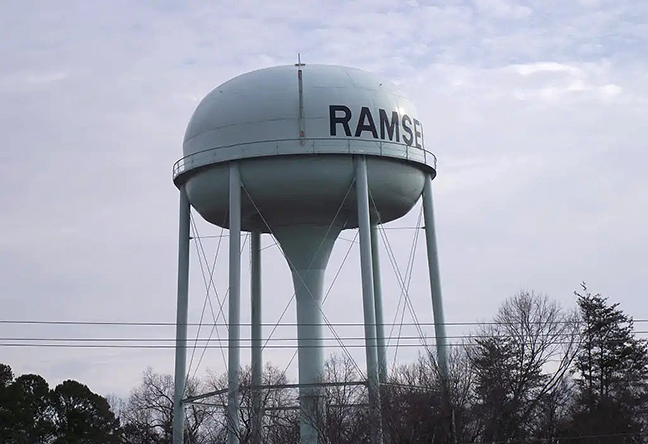Welcome!

County tables Ramseur treatment plant request
ASHEBORO — The Town of Ramseur has plans to supply 600,000 gallons of water per day to Wolfspeed, which is building a microchip plant at the Chatham Advanced Manufacturing (CAM) site. However, before that can happen, major changes must be made to the town’s water treatment plant.
On March 4, the town brought a request to the Randolph County Board of Commissioners for $2.25 million to make the upgrades. John Grey of The Wooten Company, which is consulting with Ramseur, brought the issues to the commissioners.
The upgrade to the system is two-fold, according to a two-page paper provided by the town:
“First, the water treatment system needs to be switched from gas chlorine to liquid bleach, making the water mixable with water from Asheboro and Siler City. The Ramseur request said it’s “currently working on a grant we received from the state and part of that grant is for us to switch from gas chlorine to liquid bleach. The part we don’t have the funds for is to add the ammonia feed/storage. To do this, we are estimating it would be around $1,000,000. Not only does this allow Ramseur to grow and sell the .600 MGD to Wolfspeed, it is a superior disinfection method compared to our current process.”
The second upgrade would be to the sludge removal system. The request said, “The system we currently have is un-repairable and not in operating order.” The town now hires a company with vac-trucks to pump the sludge out every three to four months. But with Wolfspeed coming on line next year, the town will need to increase its water production from 500,000 gallons per day to 1.19 million gallons per day.
“Having these track vacs in place would be a more cost efficient and effective way of removing the sludge from the settling basins,” the request said. “The estimated cost for this project would be $1,000,000. This would save the town money in the long run by not having to hire the vac-trucks as often.”
Grey told the commissioners, "To be able to use that water supply to supplement what's coming from Asheboro and Siler City to serve the CAM Site and future development, there's future things that need to be done to the water treatment plant. This really was brought about because of the Wolfspeed project and the countywide water development project."
Grey concluded by saying, "If Ramseur is going to be a part of the water supply to the CAM site, then this project needs to happen, and it needs to happen quickly."
The total request for both upgrades to the water treatment system was estimated at $2.25 million, with engineering costs added.
However, commissioners wanted more details than the two pages provided.
For that reason, the board voted to table the issue until April and ask that Ramseur provide more cost information on the project.
In other business, the commissioners approved the following budget items:
•A Golden LEAF grant of $1 million to purchase equipment for the Farm, Food and Family Education Center (FFFEC), currently under construction on East Dixie Drive, Asheboro.
•A change order of $20,980 for the Invictus renovation project at Northgate. The added cost reflects the need for mechanical climate control for multiple high-powered computers to be used in the center.
•Partial funding of federal American Rescue Plan Act (ARPA) revenues for an additional emergency communication tower in the center of the county. The $1 million falls within the Public Sector Capacity category of restricted ARPA funding.
Public comments
Public comments focused on growth in the northern part of Randolph County and on the Confederate monument in front of the 1909 courthouse.
Chris Andreoli noted that the number of mobile homes in the county is more than the state average. He said many of those in the northern portion of the county are in old mobile home parks which are improperly maintained. He said that with the expected growth driven by the Toyota Battery Plant, the county should urge development of stick-built homes which would drive up property values.
Mary Alice Asbury said she recently was employed by Toyota and found it difficult to find a home here. She said the county is losing money with the development of relatively inexpensive mobile homes.
Rhonda Carreras said loopholes in planning and zoning regulations were allowing mobile homes to be moved in without being placed on permanent foundations.
Tonya Hayes urged the commissioners to use “true consideration of planning for the northern part of the county … how we want it to grow.”
Other speakers talked about the Confederate monument. Franklin Suggs asked, “Why does the Confederate monument not bother most of us?” He believed that white citizens were led to believe that they were more able to make wise decisions. He asked that white people “listen to the requests (of the Black community) and understand what it feels like to be ignored.”
Tim Saunders compared the statue in front of the courthouse to “like poking your finger in someone’s eye. It should have been gone. By praising a rebel/secessionist, you’re praising the wrong side."
Clyde Foust, head of the Randolph County NAACP, told the commissioners that the Asheboro City Schools held a panel discussion with people who helped integrate restaurants in the county. Ironically, he said, when Asheboro High School was built in the late 1940s, the majority of the current students wouldn’t have been able to attend. He said the reason many want the monument moved off county property is because the main reason the Confederacy gave for leaving the Union was to uphold slavery. He said the message was, “White man is superior to Blacks.”
On the other hand, Dwain Roberts, commander of the local Sons of Confederate Veterans, thanked the commissioners for voting unanimously to keep the monument where it is. He said, “We did not lose the war. We’re still fighting it today.”
